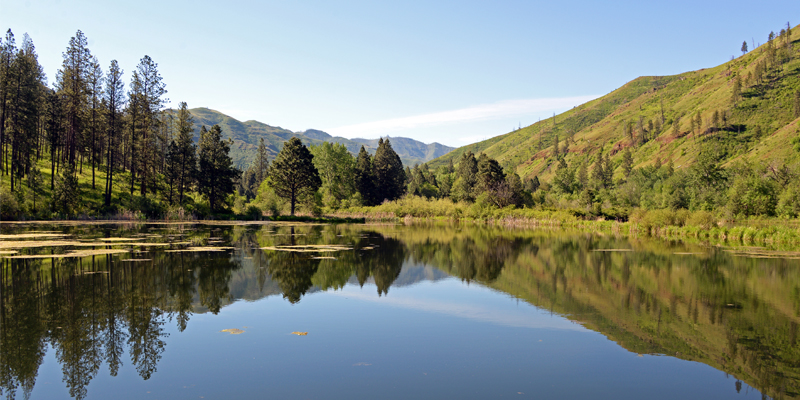
Eastern - Region 1
Customer service staff in the Spokane Regional Office are available for walk-in service 9 a.m. to 4 p.m.
2315 North Discovery Place
Spokane Valley, WA 99216-1566
United States
Fishing tips and news
Renew your fishing license
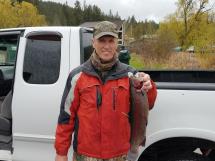
With the April 27 fishing opener coming, it’s time to renew your fishing license if you haven’t already. Washington state
fishing licenses expired March 31. You can buy your license in person at the WDFW regional office in Spokane Valley, online, by phone at 1-866-246-9453, or at any of several hundred license dealers around the state. The current Fish Washington rule pamphlet is valid through June 30.
April 27 fishing opener
Several hundred lowland lakes throughout the state open for fishing on April 27. Most waters around the region will be stocked with rainbow trout by then. You can check if your favorite lake has been stocked using WDFW’s Statewide hatchery trout and Kokanee stocking plan, or you can see all lowland lakes near you on the WDFW website.
If you need help narrowing down your options as to where to fish on opening weekend, Badger and Clear lakes in Spokane County typically fish well early in the season. Williams Lake in Spokane County, rehabilitated in fall 2022, should produce lots of rainbow trout this year, with some up to 14-16 inches.
“Fishing at Williams will be decent around the opener and will only get better as things warm up a bit this spring,” said Randy Osborne, District 2 Fish Biologist.
In northeast Washington, Waitts, Cedar, Rocky, and Starvation lakes in Stevens County and Diamond and Sacheen lakes in Pend Oreille County are prime opening day fishing lakes.
“Mudgett Lake in southwest Stevens County will also be a good bet and offers a chance for anglers to catch pan-size brook trout,” said Brian Walker, WDFW fish biologist Brian Walker.
“WDFW began stocking brook trout in this closed-basin Lake in 2021, with fish up to 14 inches reported in last-year's opening day creel.”
April 27 is also the start of WDFW’s annual trout derby, with thousands of dollars in prizes available to anyone with a valid 2024 fishing license who pulls in a tagged fish. No entrance fee or registration is required. Just catch a tagged trout anytime between April 27 and Oct. 31 and you win!
Other fishing options
Southwest Spokane County’s Amber Lake is a popular selective gear fishery, with the season running March 1 through November 30. You can keep one trout (either Westslope cutthroat or rainbow) over 18 inches each day. Internal combustion motors are not allowed on Amber. Lincoln County’s Coffeepot Lake is also under selective gear rules. It’s producing rainbow trout and yellow perch, mostly on flies.
Medical Lake, near the town of the same name in southwest Spokane County, has rainbow and brown trout. This lake is also under selective gear rules with a daily limit of two trout of at least 14 inches, and no motors of any kind allowed.
Liberty Lake, in eastern Spokane County, opened on March 1 and is ice free. It has decent catches of brown and rainbow trout. As the water warms, Liberty provides some of the earliest yellow perch and crappie fishing in the area.
Fishing from the banks of Lake Spokane (Long Lake) continues to be productive for rainbow trout in the spring. Once water levels allow use of the main boat ramps, boat anglers should find good fishing for not only rainbows but also yellow perch, walleye, crappie, and both largemouth and smallmouth bass.
At the W.T. Wooten Wildlife Area in southeast Washington’s Columbia County, five of the Tucannon Lakes are currently open- Blue, Spring, Rainbow, Watson, and Deer lakes. Curl Lake opens the Saturday of Memorial Day weekend and Big 4 Lake is no longer stocked.
Like many area rivers, a reminder that the Tucannon River typically runs very high and fast in the spring, so be very careful when doing any activity on or around it.
Kids Fishing Events

It’s time to get your children signed up for the annual Spokane Kid’s Fishing Event at Clear Lake! The event is Saturday, May 11. The $10 registration fee provides a t-shirt and fishing pole for each participant. Volunteers will be on-hand to help bait hooks, remove fish from lines, and teach the kids so parents don’t need to have any fishing experience.
Prizes will be available this year for those who bring at least two non-perishable food items to be donated to an area food bank. There will be random drawing for food donors for several prize packages including Spokane Indians baseball and Spokane Chiefs Hockey tickets, passes to area family entertainment centers like Flying Squirrel, Altitude, Wonderland, and Flight 509, and many other fun items from area supporters!
The City of Dayton and WDFW are excited to partner on the first annual Dayton Kid’s Fishing Event! The event is 3-5 p.m. on Wednesday, April 17 at the Dayton Fishing Pond, 714 S. 2nd Street. There is no registration required and a fishing pole will be provided for each child. Volunteers will be on-hand to help with all aspects of fishing but parents need to attend with their children.
Bull trout introduction public meeting
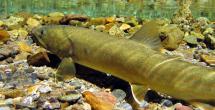
WDFW, the U.S. Fish & Wildlife Service (USFWS), and the Kalispel Tribe Natural Resources Department are proposing to introduce bull trout into Sullivan Lake and Harvey Creek near Metaline Falls in Pend Oreille County. An informational public meeting on the topic is Wednesday, Apr. 17, 2024 at 6 p.m. in the Green Room of the Cutter Theater, 302 Park Street, Metaline Falls. More information, a pre-recorded presentation on the proposal, and how to provide your input on it is here.
Hunting opportunities and news
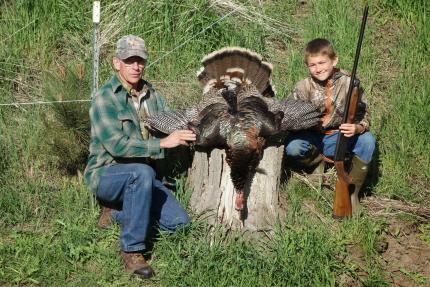
Spring wild turkey
This is what a lot of hunters look forward to all year- spring turkey season is coming on April 15! The annual youth-only
hunt for ages 15 and younger is Apr. 1-7. More information on turkey season is in the 2024 Spring Season Wild Turkey Hunting Regulation Pamphlet. A mentored hunt aimed at getting people started hunting wild turkeys is already full but there is a wait list.
The northeast area of WDFW’s Region 1 is renowned for its’ great turkey hunting. It not only has a lot of turkeys, but they are big ones. WDFW’s LeClerc Creek and Rustlers Gulch wildlife areas are great hunting spots, or the map below can help you find good turkey hunting areas on public lands in the area.
The limit for turkeys in Spokane County was increased in 2022 to allow hunters to harvest three birds. A lot of turkey hunting in Spokane County takes place on private property. If you would like to hunt private lands this year, pre-season scouting and knocking on doors to ask permission is highly encouraged. If you don’t have a private land connection or area in mind, you can find areas where property owners have agreed to let hunters hunt their lands on WDFW’s Private Lands Hunting Access webpage.
In southeast Washington, WDFW’s Asotin Creek, Chief Joseph, and W.T. Wooten wildlife areas also have good turkey hunting each year.
Hunter education
If you haven’t completed hunter education, now is the time to get it done before the turkey season starts. Hunter ed covers firearm and hunting safety, basic wildlife conservation, ethics, and more. These courses help hunters stay safe and ensure they are familiar with rules that protect public safety and maintain healthy wildlife populations.
Wildlife watching and recreation
Spring bird migration
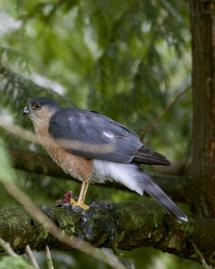
The annual spring migration of birds is starting, with thousands of ducks and geese moving into or through the region and making stopovers to feed and rest in agricultural fields and water bodies before heading further north. Tundra swans make an annual stopover each spring in northeast Washington as they take a break from their journey to ancestral breeding grounds on the Arctic tundra. Other local bird species are finding mates and nesting spots to produce offspring.
As waterfowl start to move north, there is a chance they could bring another wave of avian influenza with them. If you see sick or dead birds, please report them. If you have domestic birds, please take steps to prevent them from making contact with wild birds, such as by putting a roof over their pen, putting them inside if possible, or removing things from your property that might attract wild birds, such as water features.
Hungry bears coming out of dens
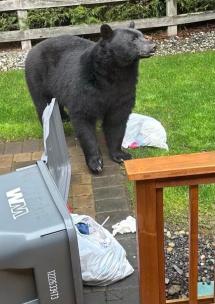
Black bears are already out and about this spring, following a mild winter. If you live in bear country, please keep garbage
secured by locking it in a shed or keeping it within electrified fencing, feed and keep pet food indoors, and put away bird feeders until next winter to avoid attracting hungry bears. Learn more about Living with Black Bears on the WDFW website.
Northeast Washington is home to grizzly bears. If you live or recreate there, WDFW is teaming up with the Kalispel Tribe, and the Pend Oreille County Library District to provide free ‘Bear Aware’ classes on April 27. The classes cover bear safety, tips and tricks to reduce wildlife conflicts around the home, bear spray instruction, safety tips for recreating, and more. Participants will receive a free can of bear spray (while supplies last). Check back for dates and how to sign up.
Safety while recreating
It’s always good practice to carry bear spray while recreating. Despite its’ name, bear spray will work on most wild mammals. Remember to keep it within reach and know how to use it.
Coyote pups are appearing this time of year so keep dogs leashed when in coyote country to avoid conflicts with protective coyote parents. Learn more about Living with Coyotes on WDW’s website.
Also be sure to keep dogs on leashes in wolf country and be very observant when recreating as you could accidentally wander into a wolf denning area. If you notice signs of wolves (tracks or scat) or see a den, leave the same way you came and avoid disturbing the wolves as much as possible. If in proximity to a den site, wolves will often bark and may “escort” you out of the area. More information on recreating in wolf country is in our blog post.
Leave wild babies wild
April is a busy month for the birth of baby animals. A reminder that if you run into fawns, baby birds, or other young animals, please leave them be, even if they appear to be orphaned or abandoned. Most animals have a parent foraging or hunting nearby. Read our blog to learn about when not to rescue wildlife.
Winter closures come to an end
Areas of the Wooten, Sherman Creek, and Asotin Creek Wildlife Areas that were closed to human entry over the winter are now open again so get outside and enjoy!
Wildlife Program biweekly reports
To read reports published prior to 2023, visit the Biweekly Wildlife Program activity reports page.
Meet your Regional Director - Mike Kuttel, Jr.
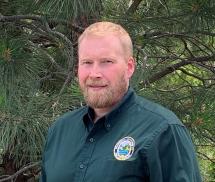
Mike Kuttel Jr. is the Eastern Region (Region 1) Regional Director. Kuttel has been with WDFW since 2015 in two statewide policy positions focused on fish and wildlife conservation and providing recreational opportunities on public and private lands through federal farm bill conservation programs and partnering with the U.S. Forest Service and Washington State Department of Natural Resources on shared stewardship of forests.
Previously, he worked for conservation districts, the Washington State Conservation Commission, and Washington State Department of Ecology. He has a bachelor’s degree in environmental science. Kuttel is a lifelong Washington resident and has lived on both sides of the Cascades. He grew up in southwest Washington fishing and hunting. In his free time, Mike enjoys hunting, fishing, hiking, camping, and foraging for mushrooms and berries with family.